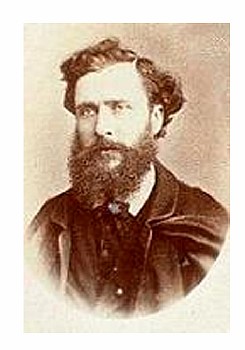|
- - - -
Valery Vrublevsky
VRUBLEVSKY Valery Antony
(27.12.1836 – 05.08.1908)
International revolutionary movement figure; General of the Paris Commune
Valery Vrublevsky was born in the village of Zheludok, Shchuchin district of Grodno region. In 1853, he finished classical school in Wilno (now Vilnius, Lithuania). In 1856, he was graduated from the Forestry and Boundary Institute of St. Petesburg (Russia). Vrublevsky became a warrant officer in 1857. Since 1861, he was a second lieutenant of the Corps of forestry officers and a head of a chasseur school in the city of Sokolka, Grodno province. In 1861–1862, he participated in the foundation of a secret revolutionary organization, was engaged in revolutionary propaganda activities. In cooperation with Kastus Kalinowsky, Vrublevsky edited and published illegal revolutionary-democratic newspaper “Muzyckaja prauda” (Peasant’s Truth) from 1862 until 1863. During the revolt of 1863–1864 he was at the head of insurgent detachments in the provinces of Grodno and Lublin, was appointed colonel and chief of the provinces of Grodno, Podlasie and Lublin. In 1864, Vrublevsky was seriously injured and emigrated to France, where he took an active part in the activity of democratic wing of Polish emigrants. During the Franco-Prussian War of 1870–1871 he joined the National Guard, participated in the defense of Paris. After the proclamation of the Paris Commune – the first government of working class in history – General Vrublevsky was in command of one of the revolutionary armies which defended the south part of Paris. After the fall of the Paris Commune he was sentenced to death in his absence and moved to London (Great Britain). Since 1871, he was a member of the General Council of the First International, a correspondent for Poland. In 1872, Vrublevsky became a head of the emigrant organization “Lud Polski” (The Polish People) in London, advocated the idea of Russian-Polish revolutionary alliance. He established contacts with Russian revolutionists and the group of the first Polish Marxists in Geneva (Switzerland) in the end of the 1870s. After the amnesty of the Paris Commune, since 1885, he lived in France. Valery Vrublevsky died in Ouarville, buried near the Communard’s Wall at the Pere Lachaise cemetery in Paris.
Literature:
1. Zlotorzycka М. Walery Wroblewski (1836–1908). Warszawa: PZWS, 1966.
2. Абрамавичюс В. Е., Дьяков В. А. Валерий Врублевский. Москва: Мысль, 1968.
3. General Walery Wro?blewski, 1836–1908. Warszawa: Wydawnictwo Ministerstwa Obrony Narodowej, 1973.

© National Academy of Sciences of Belarus, 2011
|
|


